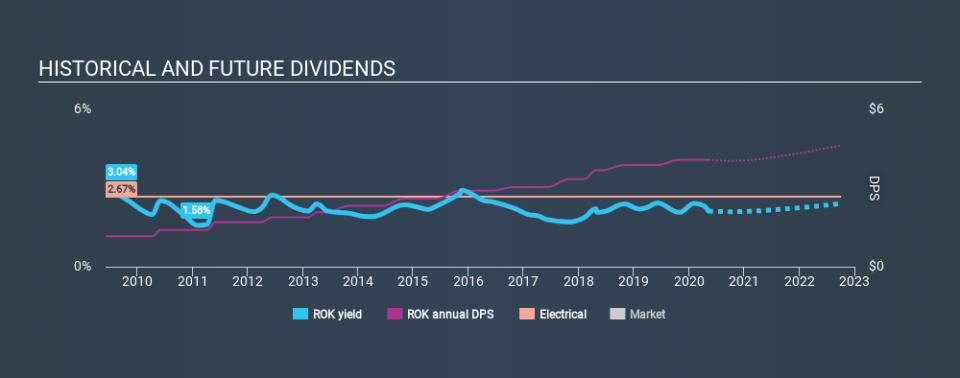Income Investors Should Know That Rockwell Automation, Inc. (NYSE:ROK) Goes Ex-Dividend Soon

Rockwell Automation, Inc. (NYSE:ROK) stock is about to trade ex-dividend in 4 days time. Ex-dividend means that investors that purchase the stock on or after the 15th of May will not receive this dividend, which will be paid on the 10th of June.
Rockwell Automation's next dividend payment will be US$1.02 per share. Last year, in total, the company distributed US$4.08 to shareholders. Looking at the last 12 months of distributions, Rockwell Automation has a trailing yield of approximately 2.1% on its current stock price of $192.45. Dividends are an important source of income to many shareholders, but the health of the business is crucial to maintaining those dividends. So we need to investigate whether Rockwell Automation can afford its dividend, and if the dividend could grow.
View our latest analysis for Rockwell Automation
Dividends are typically paid out of company income, so if a company pays out more than it earned, its dividend is usually at a higher risk of being cut. Rockwell Automation paid out 65% of its earnings to investors last year, a normal payout level for most businesses. That said, even highly profitable companies sometimes might not generate enough cash to pay the dividend, which is why we should always check if the dividend is covered by cash flow. Thankfully its dividend payments took up just 40% of the free cash flow it generated, which is a comfortable payout ratio.
It's encouraging to see that the dividend is covered by both profit and cash flow. This generally suggests the dividend is sustainable, as long as earnings don't drop precipitously.
Click here to see the company's payout ratio, plus analyst estimates of its future dividends.
Have Earnings And Dividends Been Growing?
Companies that aren't growing their earnings can still be valuable, but it is even more important to assess the sustainability of the dividend if it looks like the company will struggle to grow. If earnings fall far enough, the company could be forced to cut its dividend. With that in mind, we're not enthused to see that Rockwell Automation's earnings per share have remained effectively flat over the past five years. We'd take that over an earnings decline any day, but in the long run, the best dividend stocks all grow their earnings per share. Earnings per share growth has been slim, and the company is already paying out a majority of its earnings. While there is some room to both increase the payout ratio and reinvest in the business, generally the higher a payout ratio goes, the lower a company's prospects for future growth.
The main way most investors will assess a company's dividend prospects is by checking the historical rate of dividend growth. In the past ten years, Rockwell Automation has increased its dividend at approximately 13% a year on average.
Final Takeaway
Should investors buy Rockwell Automation for the upcoming dividend? Earnings per share have been flat and Rockwell Automation's dividend payouts are within reasonable limits; without a sharp decline in earnings we feel that the dividend is likely somewhat sustainable. It might be worth researching if the company is reinvesting in growth projects that could grow earnings and dividends in the future, but for now we're not all that optimistic on its dividend prospects.
In light of that, while Rockwell Automation has an appealing dividend, it's worth knowing the risks involved with this stock. In terms of investment risks, we've identified 3 warning signs with Rockwell Automation and understanding them should be part of your investment process.
If you're in the market for dividend stocks, we recommend checking our list of top dividend stocks with a greater than 2% yield and an upcoming dividend.
If you spot an error that warrants correction, please contact the editor at editorial-team@simplywallst.com. This article by Simply Wall St is general in nature. It does not constitute a recommendation to buy or sell any stock, and does not take account of your objectives, or your financial situation. Simply Wall St has no position in the stocks mentioned.
We aim to bring you long-term focused research analysis driven by fundamental data. Note that our analysis may not factor in the latest price-sensitive company announcements or qualitative material. Thank you for reading.

 Yahoo Finance
Yahoo Finance 
